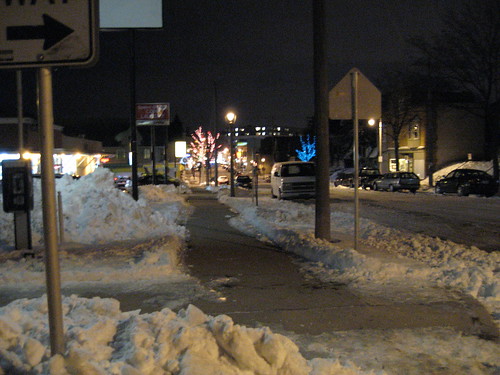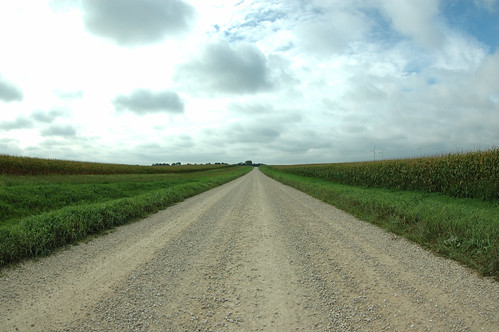 As I started to drive up to Milwaukee to begin my annual Nutcracker run, something suddenly struck me–I hadn’t left the state of Illinois since the summer! In fact, the furthest I’d wandered the whole fall was to take a few trips to Elgin, just 35 miles away from my lake front home.
As I started to drive up to Milwaukee to begin my annual Nutcracker run, something suddenly struck me–I hadn’t left the state of Illinois since the summer! In fact, the furthest I’d wandered the whole fall was to take a few trips to Elgin, just 35 miles away from my lake front home.
The last time I drove this infrequently was a solid decade ago, and it is a real contrast to the six states in six weeks, 50,000 miles a year wandering road warrior lifestyle to which I have become accustomed.
And I’m lovin’ it!
Driving simply sucks the life out of me, and I find that, as water finds its own level, so too does the musical activity in my life. Take away one piece of the professional puzzle, and it is quickly replaced, usually by something more interesting, engaging, and profitable (at least so far!). My long-haul gigs have largely been replaced by close-to-home performing (which ends up being both more musically rewarding and higher paying) and quality teaching opportunities.
One year ago, I was making regular commutes to the following towns (plus a score of other locales):
- Whitewater, WI – 93 miles
- Milwaukee, WI – 75 miles
- Memphis, TN – 582 miles
- Rockford, IL – 87 miles
Driving 4000 miles or more a month was a normal thing for me for the past decade. Sometimes I’ve wondered just how many hours, days, weeks, and months I’ve spent in the car…..
Let’s dissect the stats and see. If I drove 50,000 miles per year, averaging 60 miles per hour (I’m sure that the average speed would be lower than that, but let’s be optimistic):
| 50,000 miles/year = | 833 hours of driving |
| 833 hours = | 34 days/year |
| 34 days x 8 years = | 272 days total driving time |
| 272 days = | 9 months of my life spent driving |
I’ve spent at least nine months of my life driving to gigs these past years! I’d have to get in my car right now and drive nonstop for nine months to eaual the amount of time I’ve spent commuting to gigs these past few years.272 days of straight driving! 6664 hours spent in the car. Unbelievable.

Excising most of these long-haul engagements freed up a huge amount of time that was spent simply sitting in the car and….staring. Just ending my Whitewater, Wisconsin commutes freed up 50 hours a month, and I easily recouped the income with a few students and gigs (all of which were close to home for me).
Now, some folks love life on the road, and I can relate. After all, I love listening to the car stereo, sipping coffee, staring at the scenery, and enjoying the solitude as much as the next person. There is a certain liberating feeling about being on the road, in command of your own schedule, and traveling all over the country. And as a musician, feeling busy has a placebo effect that cannot be denied. We musicians often live in fear of the impending blank space coming up on our calendars, and there is kind of instinctual satisfaction in filling one’s schedule with “gainful” employment.
After years spent staring at the upwardly creeping odometer, however, I began to ask myself:
What is the difference between being busy and just feeling busy?
A trip to Rockford, Illinois certainly made me feel busy! It takes a couple of hours on either end to get there (without traffic…and there’s always traffic), and once you add in the time spent at the gig you’re looking at a full day of work, all for less than $100. Including mileage! Factor in real mileage costs, and you’ve only netted a couple of twenties at best for your effort. You could have made more teaching one lesson!

What if I had instead spent those eight hours teaching a little, then working on other projects, like writing, blogging, podcasting, networking, and developing relationships? Could those efforts possibly have an upward cyclic effect, leading to significantly more profitable and satisfying activities? Could working less actually benefit you more?
I’m not suggesting that there is no merit in doing this kind of long-haul work, just that folks need to take a moment and really assess the cost/benefit ratio of this kind of lifestyle. Savvy freelance musicians quickly learn to sort out worthwhile opportunities from the pile. What if I had spent some of those 6664 hours organizing my own chamber ensemble, writing grant applications, scheduling concerts, creating educational and outreach programs in my own community, and paying myself and my colleagues for these efforts. Might that have been a better expenditure of my time than driving for 272 straight days? Would I have made my own community a better place, enriching my local musical scene rather than contributing to the automotive and fast food industries?
___________
If I could offer some brief words of advice to folks embarking on a life as an instrumental music performer, it would be this:

Your time is valuable. Your services are valuable. Play in as many ensembles as you can and take as many opportunities as possible early in your career, but think critically about the merits of emerging opportunities. Are these new activities a wise expenditure of your time? The music performance lifestyle often instills a feeling of insecurity and desperation in people, causing them to take anything that comes their way, regardless of their own best interests. Resist the temptation to work in non-beneficial situations just to feel good about yourself. Instead, create your own opportunities. The possibilities are endless for energetic and creative young minds. Develop an ensemble with colleagues in your area. Build a teaching studio. Your efforts will create opportunities for other musicians, and you will be a constructive force in your region.
Proto credits:
- http://www.flickr.com/photos/rob_thomas/
- http://www.flickr.com/photos/7176592@N02/
- http://www.flickr.com/photos/emiliojurado/
- http://www.flickr.com/photos/dannyben/
Bass News Right To Your Inbox!
Subscribe to get our weekly newsletter covering the double bass world.
